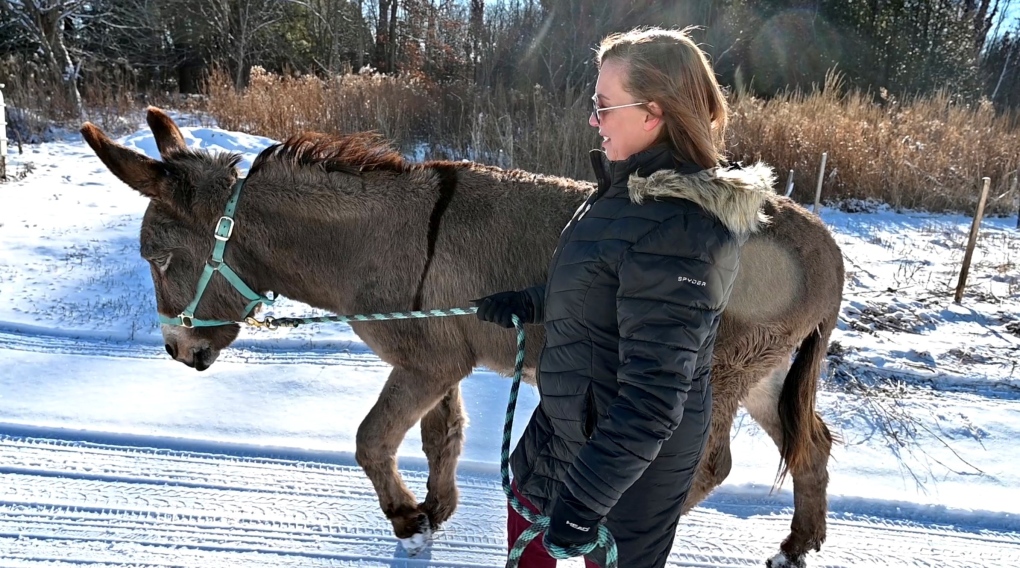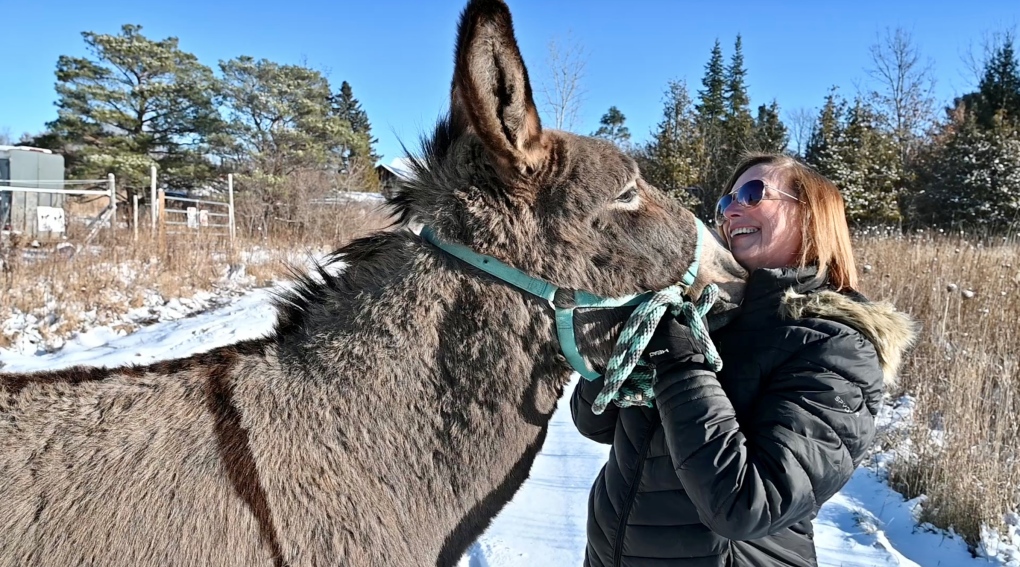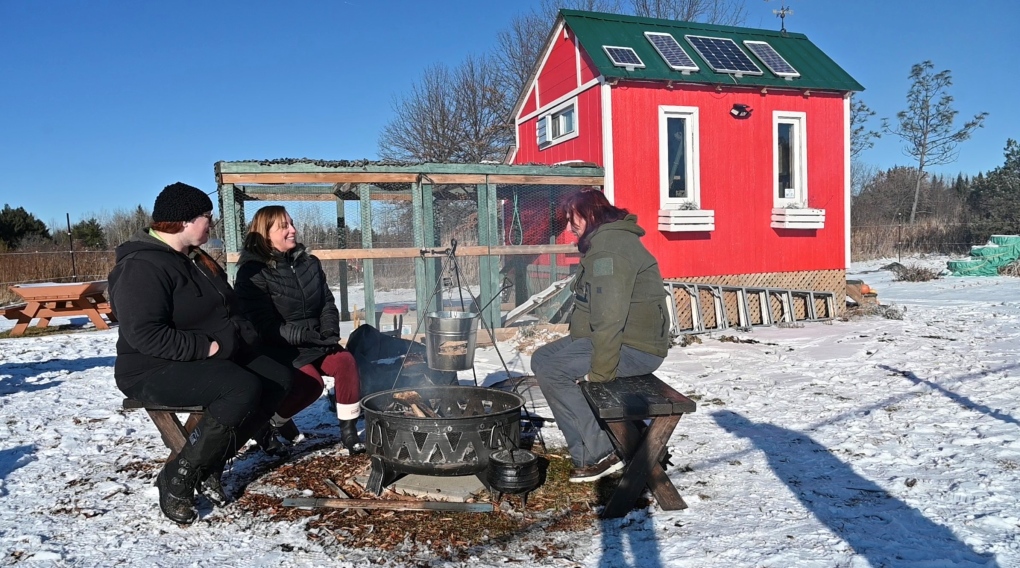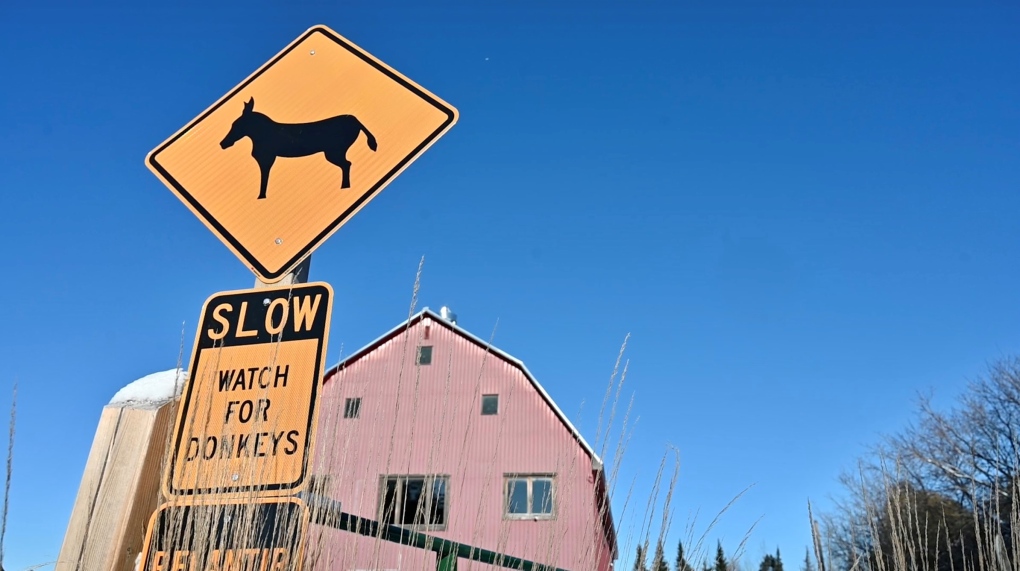A friend named Bert: A Canadian veteran living with PTSD finds hope in a donkey
Karen Stacey swings wide a creaky, stainless steel gate, announcing her arrival.
“Good morning, Bert. Are you still sleeping?”
She’s come to see a friend; a soulmate of sorts, who’s changed her life.
“Hi, buddy,” she says with a smile.
Bert turns his head toward her, clearly recognizing his visitor.
His ears point to the sky.
“Hello, handsome,” Karen whispers.
She locks her arms around his neck and gives him a gentle peck between the eyes.
“He’s a blessing. I couldn’t have asked for a better success story than to have a donkey as my best friend.”
 Karen Stacey, a Canadian Forces veteran living with PTSD, enjoys a gentle stroll with her friend Bert (Joel Haslam/CTV Ottawa)
Karen Stacey, a Canadian Forces veteran living with PTSD, enjoys a gentle stroll with her friend Bert (Joel Haslam/CTV Ottawa)
Karen still remembers the first time she and Bert met.
“Bert came up to me and gave me the biggest hug I have ever had in my life,” she says.
“I melted and said, ‘This is for me.’”
Karen is living with PTSD. She is a veteran of the Canadian Forces, doing her best to live with a painful past.
“At the very beginning of my career, I was abused. I was 24 years old,” she says.
Though traumatized, Karen felt reporting her abuse would have further costs. Disclosing her mental health challenges was not an option.
“I had a security clearance and if there was something wrong with my mind, then I compromised my security clearance.”
So Karen did her best to live with her anxiety. She kept busy. She kept to herself.
“Everything was hush, hush,” she says.
But when she became seriously injured during a training exercise, it all became too much.
“A 60-pound rucksack just collapsed my spine, so I have huge disc deterioration and chronic pain. At one point, I was up to 36 pills a day, but they just didn’t work,” she says.
“After I had my back injury, everything went quiet. And then I had to reach out and say ‘Ok, I’ve got a mental health issue,” she says.
Karen tried conventional physical and psychotherapies. They were helpful, but she found she needed more.
That’s when Karen found Bert.
 Karen Stacey pauses to hug Bert the service donkey during a walk at the Women Warriors Healing Garden (Joel Haslam/CTV Ottawa)
Karen Stacey pauses to hug Bert the service donkey during a walk at the Women Warriors Healing Garden (Joel Haslam/CTV Ottawa)
“He has no judgement and keeps me really happy. He gives you all the love you need.”
Bert isn’t a pet. And he’s much more than a farm animal. He’s part therapist, a best friend to people in pain, like Karen.
“He’s a special guy. I don’t know if every donkey is the same, but we love our Bert,” she smiles.
Karen and Bert’s friendship began at the Women Warriors Healing Garden in Blackburn Hamlet.
“It still hurts. So, finding this place and being able to let everything go is fantastic. This is 52 acres of freedom that I can wander as I want. No judgement, no stress, no pain. Just a lot of love,” she says.
Co-founded by an American military veteran, Erin Kinsey, and an Ottawa psychotherapist, Elaine Waddington Lamont, the garden is a place for veterans to heal.
 Co-founders of the Women Warriors Healing Garden, Elaine Waddington Lamont (left) and Erin Kinsey (right) share a fireside chat with Karen Stacey (centre) at the Women Warriors Healing Garden. (Joel Haslam/CTV Ottawa)
Co-founders of the Women Warriors Healing Garden, Elaine Waddington Lamont (left) and Erin Kinsey (right) share a fireside chat with Karen Stacey (centre) at the Women Warriors Healing Garden. (Joel Haslam/CTV Ottawa)
“Whether a person’s a woman, or LGBTQ, we don’t leave people on the battlefield injured. We get them help,” says Kinsey.
The Healing Garden offers veterans countless ways to connect with nature and the environment.
They can garden, learn bee keeping, tend a chicken coop, take art therapy courses, or walk with Bert
Lamont says the experiences take them away from their pain and help them give focus to living in the moment.
“Part of healing is learning where safe places are through your senses,” says Waddington Lamont.
“They realize ‘the things that I’ve lived through, the challenges, they’re not here right now, and I can feel safe. I can take some steps towards recovery and healing.’”
According to Waddington Lamont, women represent about 15 per cent of the serving members of the Canadian Forces, and about 15 per cent of veterans.
“A minority in number and they have been traditionally underserved in terms of programs available to them,” she says.
“Unfortunately, sometimes women and members of the 2SLGBTQ community will have experienced injuries related to sexual trauma or sexual harassment and they may not feel comfortable in a group of other veterans that may include men,” she says.
“This offers them a space of their own.”
“This is somewhere where people can come and engage in post traumatic growth,” says Kinsey.
“They can build relationships with other vets; true, deep relationships. They can feel empathy for each other and the animals. It demonstrates we’re all part of a process of getting better.”
That empathy is undeniably visible between Karen and Bert.
“Donkeys really do have their favourite people and Karen and Bert are really connected,” says Kinsey.
“He wants to cuddle and snuggle her and just be right by her side. She is his person,” says Waddington Lamont.
 A sign at the Women Warriors Healing Garden, home to Bert the service donkey (Joel Haslam/CTV Ottawa)
A sign at the Women Warriors Healing Garden, home to Bert the service donkey (Joel Haslam/CTV Ottawa)
And Karen Stacey believes Bert is helping her get better.
“He feels me,” she says.
“If my heartbeat starts to race, he’ll stop. He won’t budge. And he’ll just want me to hug him. So, I’ll hug him and pet him and he’ll put his face in my face and we’ll walk on.”
Karen says she’s walking on to a better place.
“Bert just gives me peace.”
And for this soldier, that’s everything.
Karen’s donkey is her hero.
“He knows a broken heart when it comes around and he’s fixed it.”
CTVNews.ca Top Stories

Trudeau calls violence in Montreal 'appalling' as NATO protest continues
Anti-NATO protesters gathered again in Montreal on Saturday to demand Canada withdraw from the alliance, a day after a demonstration organized by different groups resulted in arrests, burned cars and shattered windows.
7 suspects, including 13-year-old, charged following 'violent' home invasion north of Toronto
Seven teenage suspects, including a 13-year-old, have been arrested following a targeted and “violent” home invasion in Vaughan on Friday, police say.
These vascular risks are strongly associated with severe stroke, researchers say
Many risk factors can lead to a stroke, but the magnitude of risk from some of these conditions or behaviours may have a stronger association with severe stroke compared with mild stroke, according to a new study.
Widow of Chinese businessman who was executed for murder can sell her Vancouver house, court rules
A murder in China and a civil lawsuit in B.C. have been preventing the sale of multiple Vancouver homes, but one of them could soon hit the market after a court ruling.
Cher 'shocked' to discover her legal name when she applied to change it
Cher recalls a curious interlude from her rich and many-chaptered history in her new book 'Cher: The Memoir, Part One.'
Black bear killed in self-defence after attack on dog-walker in Maple Ridge, B.C.
A black bear has died following a brawl with a man on a trail in Maple Ridge, B.C.
Retiring? Here's how to switch from saving for your golden years to spending
The last paycheque from a decades-long career arrives next Friday and the nest egg you built during those working years will now turn into a main source of income. It can be a jarring switch from saving for retirement to spending in retirement.
Canadian neurosurgeons seek six patients for Musk's Neuralink brain study
Canadian neurosurgeons in partnership with Elon Musk's Neuralink have regulatory approval to recruit six patients with paralysis willing to have a thousand electrode contacts in their brains.
Police thought this gnome looked out of place. Then they tested it for drugs
During a recent narcotics investigation, Dutch police said they found a garden gnome made of approximately two kilograms of MDMA.

































